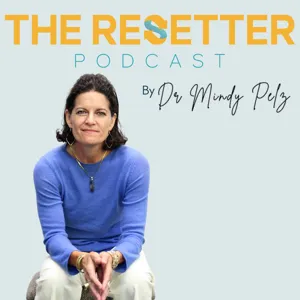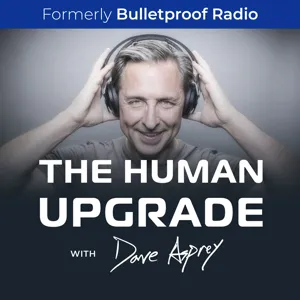Podcast Summary
Understanding the role of estradiol in women's health: Estradiol loss in women's late thirties/early forties can lead to weight gain, cognitive decline, and depression. HRT/bioidenticals and lifestyle changes can help alleviate symptoms.
As women enter their late thirties and early forties, they begin to lose the powerful hormone estradiol, which has numerous functions including mental alertness, happiness, sleep, learning, and libido. This hormonal shift can lead to various symptoms such as weight gain, cognitive decline, and depression. Integrative OBGYN Dr. Felice Gersh advocates for the use of HRT or bioidenticals to help alleviate these symptoms, but also emphasizes the importance of lifestyle changes. Estradiol plays a significant role in maintaining various bodily functions, and its diminishment can lead to a multitude of issues. By understanding the importance of estradiol and the available solutions, women can make the transition from ovulating to postmenopausal smoother and improve their overall wellbeing. The Resetter podcast episode featuring Dr. Gersh provides valuable insights and solutions for women navigating menopause.
Menopause as a process of hormonal changes: Menopause is a complex process of ovarian aging, not a finite event, affecting every organ system and leading to the loss of reproductive capability and hormone decline.
The concept of menopause as a finite event with a clear definition and a label is a misconception. Instead, it's a long, complex process of ovarian aging that results in the loss of reproductive capability and the decline of hormone production. This process, which transforms a reproductive woman into a nonreproductive one, is unique to every woman and affects every organ system in the body. The definition of menopause as 12 consecutive months without vaginal bleeding is arbitrary and doesn't account for the variability of individual experiences. It's essential to redefine menopause as a process rather than a finish line and recognize the importance of these vital hormones, which are crucial for optimal health throughout a woman's life.
Understanding Menopause and Ovarian Aging: Menopause is a natural part of aging, but hormonal fluctuations during perimenopause can be variable, affecting women differently. Estradiol levels can range greatly, and high pituitary hormones may indicate an ovary's inability to produce estrogen effectively.
Menopause and ovarian aging are inevitable processes that women go through, typically between the ages of 45 and 55, although it can vary. Early menopause is associated with earlier onset of aging-related conditions. During perimenopause, women may experience hormonal fluctuations, which can be quite variable from woman to woman. Estradiol, the primary estrogen produced by the ovaries, can range greatly during this time. The pituitary gland plays a role in regulating hormone production by the ovaries, and high levels of pituitary hormones can indicate an ovary's inability to produce estrogen effectively. In summary, menopause is a natural part of aging, and while some factors like genetics, diet, and stress can influence the timing and experience, it is an inevitable process.
Understanding hormonal patterns during ovarian aging: High gonadotropin levels indicate hormonal imbalance during ovarian aging, not necessarily postmenopause. Supplementing with hormones instead of replacing them can be beneficial.
High gonadotropin levels indicate a woman is in the process of ovarian aging, not necessarily postmenopausal. This stage is marked by insufficient hormone production, particularly estrogen and progesterone. The hormonal pattern resembles a series of small blips instead of the typical mound shape. This is a sign that supplementing with hormones, not replacing them, can be beneficial. The comparison to other insufficient hormones, like thyroid, supports this approach. The brain perceives insufficient hormones and sends out signals to produce more, leading to hyperstimulation of the ovaries. This stage is not the end of the road for hormone production but rather the middle, making supplementation an effective solution.
Natural hyperstimulation of ovaries during perimenopause: Perimenopause leads to natural egg release and estrogen surge, but estrogen supplementation may prevent this process, increasing the likelihood of twins but potentially affecting hormonal fluctuations and overall health during pregnancy.
During perimenopause, women experience a natural hyperstimulation of their ovaries, leading to the release of multiple eggs and a surge of estrogen. However, if estrogen is supplemented, the brain will not initiate this process, potentially resulting in less intense hormonal fluctuations. Interestingly, perimenopausal women are more likely to conceive twins due to this natural hyperstimulation. As humans are the only species attempting to control our reproductive destiny, it's crucial to understand our fundamental design for procreation and the importance of maintaining a healthy cardiovascular system and energy production during pregnancy.
Estrogen's Role in Women's Health and Functioning: Estrogen impacts multiple organ systems, including the cardiovascular system, brain, kidneys, bones, muscles, and gut, and its loss during menopause can lead to negative health consequences, such as changes in the gut microbiome and impaired gut barrier function, affecting nutrition and inflammation, and impacting cognition and gut motility.
Estrogen plays a crucial role in the health and functioning of various organ systems in women, particularly during pregnancy and beyond. Estrogen acts as a metabolic homeostasis regulator, affecting the cardiovascular system, brain, kidneys, bones, muscles, and gut, among others. The loss of estrogen during menopause can lead to negative health consequences, such as changes in the gut microbiome and impaired gut barrier function, which can impact nutrition and inflammation. The neurological system, specifically the enteric nervous system and its neurotransmitters, is also regulated by estrogen, affecting gut motility and cognition. Therefore, the loss of estrogen during menopause can have far-reaching effects on various aspects of health.
Menopause impacts the autonomic nervous system and immune system: Menopause causes hormonal shifts affecting the autonomic nervous system, leading to symptoms like poor gut function, constipation, and palpitations. Estradiol deficiency can result in neurotransmitter imbalance, impacting various organ systems including the immune system.
During menopause, women experience hormonal shifts that can lead to dysregulation of the autonomic nervous system. This can result in various symptoms, including poor gut function, constipation, and palpitations. The neurotransmitters of the sympathetic nervous system, which is responsible for the stress response, are modulated by estradiol. A deficiency or insufficiency of estradiol can cause these neurotransmitters to become imbalanced, leading to numerous health issues. Furthermore, every immune cell in the body has estrogen receptors, making the immune system another crucial organ system affected by menopause. To address these challenges, Dr. Mindy and Tony Horton have created PowerSync 60, a revolutionary 60-day fitness program for both men and women. It includes a customized meal plan and fasting to support overall health and wellbeing. Additionally, Dr. Mindy's research reveals that estradiol plays a significant role in activating neurotransmitters like serotonin, dopamine, acetylcholine, glutamate, and oxytocin, which are linked to happiness, cognition, and connection to others. As estradiol levels decrease during menopause, these neurotransmitters can also be affected, making it essential to find ways to support women during this transition.
Estradiol's Role in Bodily Functions: Estradiol impacts sexual function, appetite, circadian rhythm, and brain health by regulating hormones and influencing brain activity. Inadequate estradiol levels can lead to neuroinflammation and neuronal damage, contributing to conditions like Alzheimer's disease.
Estradiol plays a crucial role in various bodily functions, including sexual function, appetite regulation, and maintaining a healthy circadian rhythm. Oxytocin, another essential hormone for sexual function, relies on estradiol to function properly. Estradiol also helps regulate appetite by influencing the activity of appetite regulators like ghrelin and leptin. Moreover, the hypothalamus, a critical part of the brain, has estrogen receptors, and an adequate balance of estradiol is essential for proper brain function. Without enough estradiol, the immune system's specialized cells, microglia and astrocytes, can become overactive and destructive, leading to neuroinflammation and neuronal damage, which can contribute to conditions like Alzheimer's disease. Overall, estradiol's importance extends beyond reproductive success and impacts various bodily functions, making it a vital hormone for overall health.
Understanding the Role of Estradiol in Menopause: During menopause, natural estradiol production decreases, causing symptoms. Hormone replacement therapy with bioidentical human hormones can help alleviate symptoms and improve overall health.
Estradiol, a crucial hormone derived from testosterone in men and women, plays a significant role in various bodily functions. However, during menopause, the production of estradiol decreases, leading to various symptoms. While we cannot fully replicate the functions of healthy ovaries through hormone supplementation, it is essential to understand that hormone replacement therapy is a better alternative to not having the hormones at all. The Women's Health Initiative study, which used horse estrogens and combined it with a synthetic progesterone, led to a negative perception of hormone therapy. However, the use of bioidentical human hormones, which closely mimic the body's natural hormones, can help alleviate menopause symptoms and improve overall health. It is important to consult healthcare professionals for proper guidance on hormone therapy and dosage.
Aligning HRT with lunar cycle for optimal function: Using physiologic doses of bioidentical hormones and pulsing progesterone can enhance HRT's effectiveness. Aligning it with the lunar cycle, though not proven, could further improve its benefits.
Hormone replacement therapy (HRT) for women going through menopause should involve using physiologic doses of bioidentical hormones, similar to what the body naturally produces, and pulsing the progesterone to mimic a normal menstrual cycle. This approach aims to maintain optimal total body function and can be further enhanced by synchronizing HRT with the lunar cycle. The theory behind this is that women have a lunar cycle, and historically, ovulation and mating seasons coincided with the full moon. This theory, though not proven, suggests that aligning HRT with the lunar cycle could enhance its effectiveness. Overall, the goal is to provide the body with the right amount of hormones to maintain balance and improve overall health.
Complementing Hormonal Treatments with Lifestyle Modifications: Adopt a healthy lifestyle to support overall wellbeing during menopause by focusing on nutrition, nurturing the gut microbiome, and avoiding processed foods. Complement hormonal treatments for optimal health.
While hormone replacement therapy (HRT) or bioidenticals can help manage hormonal changes during menopause, they don't fully replace the natural ovarian cycle. Therefore, it's crucial to adopt a healthy lifestyle to support overall wellbeing. This includes focusing on nutrition, nurturing the gut microbiome, and avoiding processed foods. The idea is to complement hormonal treatments with lifestyle modifications for optimal health. The discussion also touched upon the historical significance of women's menstrual cycles being synchronized with the full moon, suggesting that reconnecting with nature could potentially influence our health and wellbeing.
Essential Foods for Optimal Health: Phytoestrogens: Consuming a diverse range of phytoestrogen-rich foods like soy, flaxseeds, pomegranates, fruits, and vegetables is vital for maintaining gut health, overall nutrition, and alleviating menopause symptoms.
Consuming minimally processed foods rich in phytoestrogens, such as soy, flaxseeds, pomegranates, and various fruits and vegetables, is essential for maintaining gut health and overall nutrition. Phytoestrogens act as natural sources of antioxidants, micronutrients, and macronutrients, contributing to better health as we age. Studies suggest that these compounds may help alleviate symptoms of menopause, making them particularly beneficial for women. Incorporating a diverse range of these foods into your diet is crucial for maximizing your health savings account and enjoying optimal health throughout your life.
Balanced Diet, Alcohol Consumption, and Exercise for Menopausal Women: A balanced diet, moderate alcohol consumption, and regular exercise can help mitigate the effects of menopause on overall health. Adjust exercise routines and avoid alcohol when focusing on rebuilding health or dealing with gut issues.
A balanced diet, including plant-based foods and small amounts of healthy animal products, is essential for overall health during menopause. While there are various aspects of lifestyle to consider, nutrition is the foundation. Regarding alcohol, moderate consumption, particularly for menopausal women dealing with hormonal imbalances, can offer relaxation benefits. However, it should be avoided when focusing on rebuilding health or dealing with gut issues. Exercise is crucial for menopausal women, as it upregulates BDNF and stimulates serotonin receptors, offering benefits similar to estradiol. However, it's important to adjust exercise routines as estradiol levels decline to prevent injuries. In summary, focusing on a balanced diet, mindful alcohol consumption, and regular exercise can help mitigate the effects of menopause on overall health.
Rebooting the body during menopause: Focus on hormonal balance, lifestyle changes, exercise, and regular health checks to maintain overall health during menopause.
As women approach menopause, it's essential to prioritize a holistic approach to health, focusing on both hormonal balance and lifestyle changes. Exercise is a crucial component, as it can help reboot the gut microbiome and maintain muscle mass, acting as an endocrine organ and contributing to overall health. Additionally, the perimenopausal years, leading up to menopause, are a critical time for addressing potential health issues, including vascular changes, bone density loss, and cognitive function declines. By staying informed, testing hormones, and considering exogenous hormone support, women can better navigate this stage of life and mitigate potential health complications. Remember, the menopausal experience is not a one-thing approach; it requires a multifaceted, proactive strategy.
Embracing Menopause: A Significant Part of Women's Lives: Adapt to menopause with lifestyle choices, consider hormone replacement therapy, and prioritize overall health for a fulfilling post-menopausal life.
Menopause is a relatively new experience for women, as historically, the average lifespan was much shorter, and menopause was not a significant part of a woman's life. However, with modern times and increased life expectancy, women now spend a significant portion of their lives as menopausal women. As such, it's essential for us to adapt to this stage of life and take steps to maintain our health. This includes lifestyle choices like fasting, exercise, stress control, sleep, circadian rhythm issues, nutrition, and avoiding toxicants. Additionally, hormone replacement therapy can be a personal choice to help alleviate symptoms and maintain overall health. Menopause is not just about making babies but about sustaining health in every organ system, and hormones like estradiol and progesterone play a crucial role in this process.
Menopause requires more than just nutrition: Embrace self-care, hormonal balance, and a healthy lifestyle for optimal menopause experience, leading to personal growth and wisdom sharing.
Just providing the body with necessary nutrients isn't enough for optimal health, especially during menopause. The body requires instructions to function correctly, and these instructions come from hormones. Hormones act as the foundation, but other factors are also essential. Without all the ingredients, just like baking a cake without one key ingredient, the result will be incomplete. The speaker advocates for a "menopausal redesign," where women take charge of their health in their forties and emerge from the perimenopausal years as their best selves, ready to share their wisdom with others. Self-care is crucial, and the speaker shared her daily self-care routine, which includes a relaxing bath and progressive relaxation. Her superpower is her stamina and unyielding energy.
A Dedicated OB-GYN's Passion for Helping Women: Dr. Gersh emphasizes considering root causes, lifestyle changes, and conventional medical care for women's health at every stage, inspiring action towards better understanding of bodies.
Dr. Gersh, a dedicated integrative OB-GYN, has a burning passion for helping women at every stage of life and refuses to retire from her mission. She emphasizes the importance of considering root causes and incorporating lifestyle changes into treatment plans while also utilizing conventional medical care. To connect with Dr. Gersh, follow her on Instagram live, visit her practice in Irvine, California, or read her books, including "Menopause, 50 Things You Need to Know." These resources offer in-depth insights from her extensive expertise. By sharing this conversation, we hope to inspire women to prioritize their health and take action towards understanding their bodies better.






